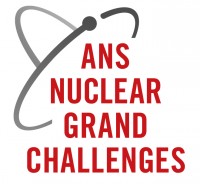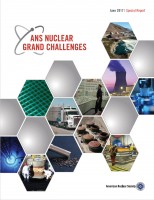Announcing the ANS Nuclear Grand Challenges
 As I considered how ANS could best forward the interests of nuclear professionals during my term as president (June 2016-June 2017), I was compelled by the idea of identifying the technical nuclear challenges that need to be resolved by 2030 in order to help solve some of the economic, sociological, or political issues that we face as a society.
As I considered how ANS could best forward the interests of nuclear professionals during my term as president (June 2016-June 2017), I was compelled by the idea of identifying the technical nuclear challenges that need to be resolved by 2030 in order to help solve some of the economic, sociological, or political issues that we face as a society.
ANS members are recognized globally as the credible technical voices that we are. I felt that the outcome would carry more importance and relevance if the membership and our organizations, such as the ANS Professional Divisions, as well as the broader nuclear science and technology communities, were involved in identifying the challenges.
When we started, I did not have any preconceived notions about how many ideas we would get or how engaged our members would become in this Society-wide activity, but the numbers far exceeded anything that I could have imagined.
We directly received nearly 300 suggestions, and countless others were discussed within our Divisions. I want to thank those of you who offered your recommendations. While we received a few duplicate entries, most were not - which tells you something about the number of issues on the minds of nuclear professionals.
It was no small task to sort through so many relevant issues. I asked the ANS Divisions to review those that fell within their areas of technical expertise, and they then selected one to three for consideration among the final ANS Nuclear Grand Challenges that I announced at the ANS Annual Meeting today. The selection committee that included our division leadership and the ANS Board of Directors reviewed all of the options and voted to choose the top overall challenges.
I found that some of the top vote-getters addressed similar or complementary topics, so those were combined, and the result is nine ANS Nuclear Grand Challenges.
At the President's Special Session at the Annual Meeting this afternoon, some of the top experts from our nuclear communities will present each Challenge area, and we will discuss the initial steps in tackling these Challenges.
 Briefly, here are the ANS Nuclear Grand Challenges, in no particular order of importance.
Briefly, here are the ANS Nuclear Grand Challenges, in no particular order of importance.
- Establish the basis for modern low-dose radiation regulation. The focus of this challenge is on setting the scientific basis and guidelines for the health effects of low-dose radiation and replace the Linear-No-Threshold (LNT) approach with a modern, science-backed model for nuclear radiation safety. If the LNT model can be replaced with a scientifically defensible model, underpinned by the latest biological research methods, we can achieve both higher levels of safety while reducing unnecessary operations and waste disposal costs.
- Transform the way the nuclear technologies sector thinks about public engagement. If we are going to change the way the public views nuclear energy, we must first transform the way that we think about public outreach. We have to move away from approaches that rely heavily on our focus and delivery of scientific facts, to a more evidence-based communications model that builds mutual respect with the public over time. We are all going to need some training in this area.
- Close the nuclear fuel cycle. To achieve this and obtain maximum value while minimizing environmental impact from using nuclear fuel, there must be a pathway to support the demonstration and deployment of advanced fission reactors, accelerators, and material recycling technologies.
- Ensure continuous availability of radioisotopes. Medical isotope production has been threatened in recent years. Our challenge is to develop a dependable technical approach to ensuring the continued availability of radioisotopes for medical, energy, research and national security applications.
- Rejuvenate nuclear technology infrastructure and facilities. Skilled scientific staff and facilities are required for research, testing, development, and deployment of advanced nuclear technologies. Maintaining national nuclear technology testing and development capabilities are critical to commercial nuclear businesses.
- Accelerate the development and qualification of advanced materials. This also applies to advanced materials that can withstand extreme fission, fusion, and space power and propulsion environments. Finding solutions to this challenge will benefit not only nuclear energy research, but applications for many other industries.
- Accelerate utilization of simulation and experimentation. This will enable the development of first principles predictive simulation capabilities that are necessary to transition nuclear energy system design and licensing from reliance on experiments to reliance on modeling and simulation. At the same time, testing and expeirmentaton is still required to provide benchmarking for the developed models and results.
- Expedite licensing and deployment of advanced reactor designs. We must develop a practical path forward for applying innovative approaches to licensing advanced reactor designs. We must do this in a way that reduces the regulatory burden while still ensuring safety and meeting the pace of commerce. Eliminating difficulties facing the licensing and construction of new nuclear power plants would impact nuclear power investments significantly.
- Expedite nuclear education updates and knowledge transfer. The higher education Nuclear Engineering curriculum must better match today's professional workforce needs. The fact is that the average age of the nuclear workforce is over 50. These professionals have a wealth of knowledge that is not necessarily in books. As they leave the workforce, that knowledge is at risk of being lost. So we must look for ways to ensure that knowledge transfer as well.
Those are the nine ANS Nuclear Grand Challenges, in a nutshell. I hope that you will download the electronic version from the ANS website and consider how you can get involved in addressing the Challenges. I look forward to working with you to turn these challenges into opportunities.

